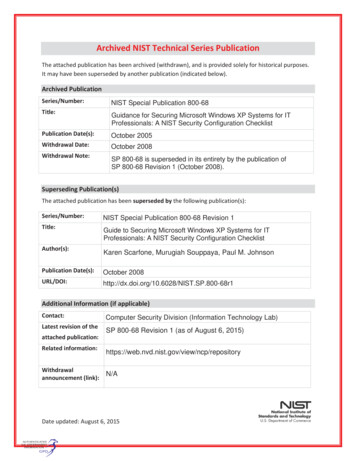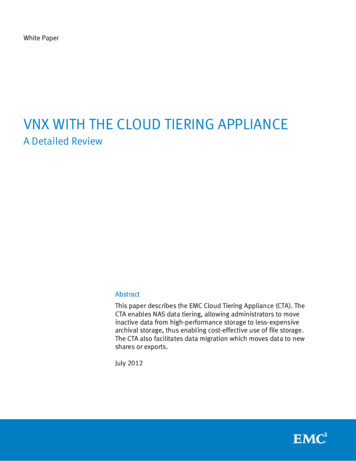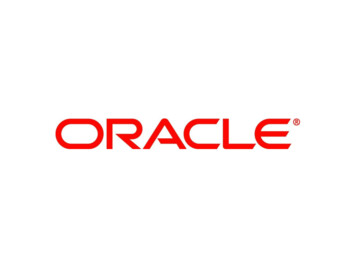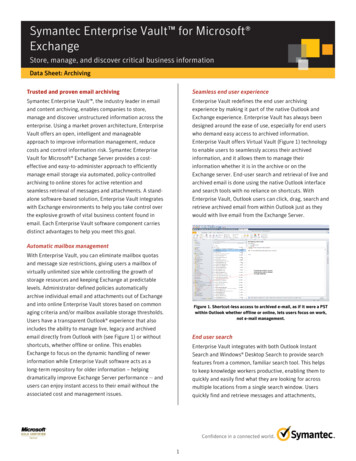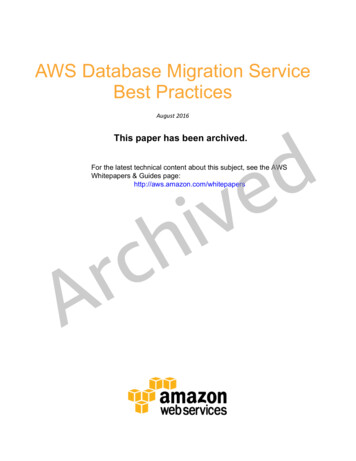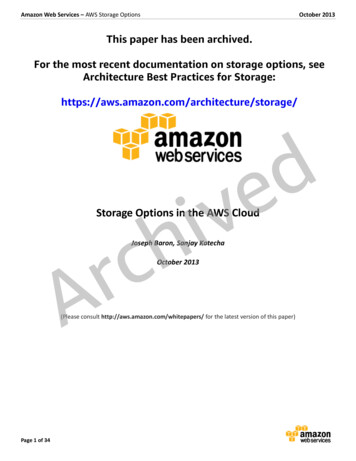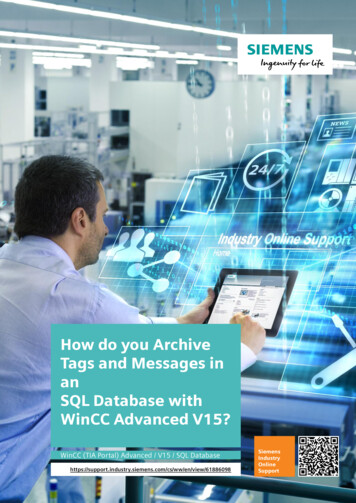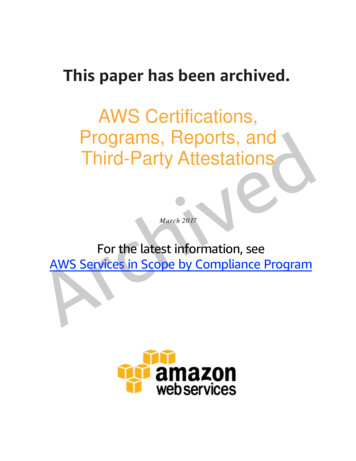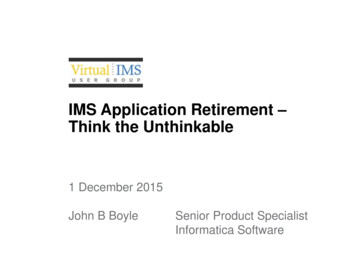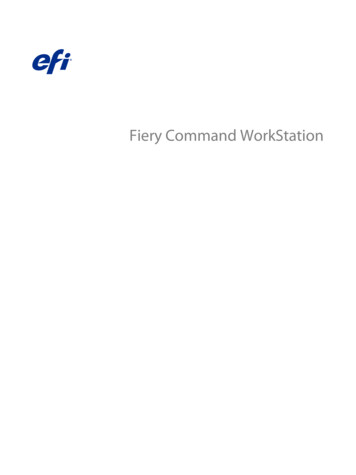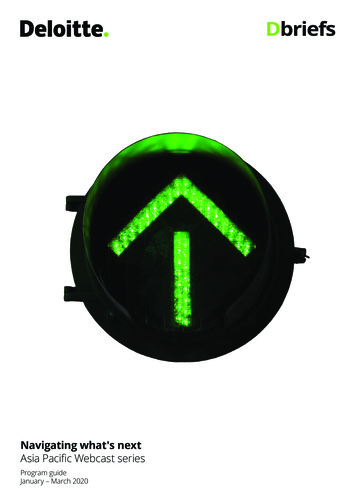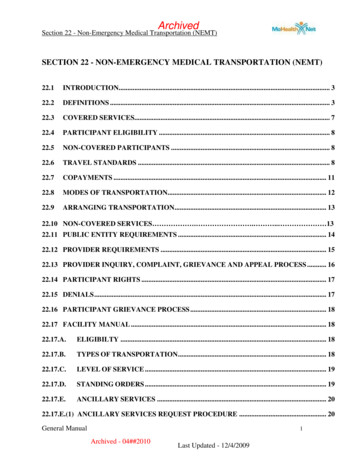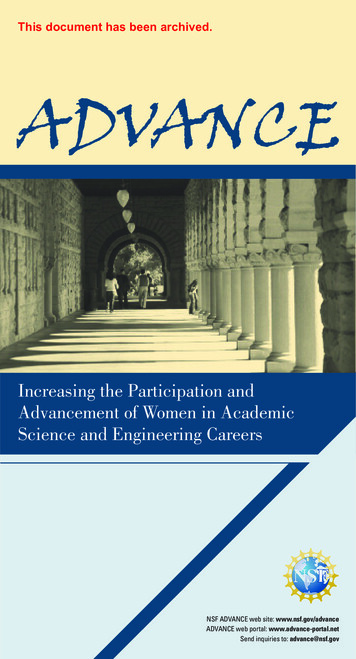
Transcription
This document has been archived.ADVANCEIncreasing the Participation andAdvancement of Women in AcademicScience and Engineering CareersNSF ADVANCE web site: www.nsf.gov/advanceADVANCE web portal: www.advance portal.netSend inquiries to: advance@nsf.gov
This document has been archived.BackgroundThe goal of the National Science Foundation’s (NSF) ADVANCE program is to increasethe representation and advancement of women in academic science and engineeringcareers, thereby developing a more diverse science and engineering workforce.ADVANCE encourages institutions of higher education and the broader science,technology, engineering, and mathematics (STEM) community, including professionalsocieties and other STEM related, not for profit organizations, to address various aspectsof STEM academic culture and institutional structure that may differentially affect womenfaculty and academic administrators. As such, ADVANCE is an integral part of the NSF’smultifaceted strategy to broaden participation in the STEM workforce, and it supportsthe critical role of the Foundation in advancing the status of women in STEM academiccareers.For many decades, an increasing number of women have obtained STEM doctoraldegrees, yet women continue to be significantly underrepresented in almost all STEMacademic positions. The degree of underrepresentation varies among STEM disciplines,although women’s advancement to senior ranks and leadership is an issue in all fields.Research* has shown that women’s representation and advancement in academic STEMpositions are affected by many external factors that are unrelated to their ability, interest,and technical skills, such as: Organizational constraints of academic institutions; Differential effects of work and family demands; Implicit and explicit bias; and Underrepresentation of women in academic leadership and decision making positions.The cumulative effect of such diverse factors has been to create barriers that impact thenumber of women entering and advancing in academic STEM careers.* A summary of the relevant research can be found in the 2007 National Academies’ report Beyond Bias andBarriers: Fulfilling the Potential of Women in Academic Science and Engineering.
This document has been archived.ADVANCE ProgramADVANCE was established in 2001 when the NSF’s Office of the Director allocated funding toits directorates and offices to support the program. The current supporting directorates andoffices are:Directorate for Biological SciencesDirectorate for Computer & InformationScience & EngineeringDirectorate for Education & HumanResourcesDirectorate for Mathematical & PhysicalSciencesDirectorate for Social, Behavioral &Economic SciencesOffice of CyberinfrastructureDirectorate for EngineeringOffice of International Science & EngineeringDirectorate for GeosciencesOffice of Polar ProgramsThis NSF wide model continues to be the basis for the program’s budget and managementprocesses, with representatives from the participating NSF directorates and offices servingon the ADVANCE Implementation Committee (AIC). Since 2001, NSF has invested over 135M to support ADVANCE projects at more than one hundred different institutions ofhigher education and STEM related, not for profit organizations in forty one states, theDistrict of Columbia, and Puerto Rico (including twenty four Experimental Program toStimulate Competitive Research, EPSCoR, jurisdictions).The ADVANCE program currently supports the following types of projects:Institutional Transformation (IT) supports comprehensive, institution wide projects atinstitutions of higher education to transform institutional practices and climate. Theseprojects must be based on the relevant social science literature. This organizationalapproach was identified as an important strategy by NSF because research indicatesthat the lack of women’s full participation in science and engineering academic careersis often a systemic consequence of the academic culture and organizational structureof institutions of higher education.IT Catalyst supports self assessment activities at institutions of higher education, such asbasic data collection and analysis and the review of relevant policies and procedures, toprovide the foundation necessary to undertake institutional transformation. Piloted in 2008as IT Start, this component is intended to increase the diversity of the types of universitiesand colleges ready to undertake institutional transformation. As a result of the pilot, elevenawards were made to institutions including predominately undergraduate institutions,minority serving institutions, and a university with a significant population of disabled students.Partnerships for Adaptation, Implementation, and Dissemination (PAID) supportsinstitutions of higher education, professional societies, and/or other STEM related, not for profit organizations to undertake projects that vary in size and scope. PAID projects aredesigned to broadly share lessons learned from institutional transformation projects, andalso to provide information and training about gender in academic careers. For example,PAID projects may adapt IT strategies to new types of institutions and/or disseminaterelevant research, strategies, tools, and materials to various audiences.
This document has been archived.ADVANCE StrategiesADVANCE Institutional Transformation awardees have developed and implemented many strategfaculty and leadership positions. Many of the ADVANCE PAID and Leadership awards have adapstrategies, tools, and materials to various audiences.Detailed information about the particular strategies of ADVANCE institutions, including the instituweb sites through the ADVANCE web portal (www.advance portal.net). It is important to note thaInstitutional Structure: Universities and colleges often have organizational barriersthat can negatively impact the participation of women and other underrepresentedindividuals in academic careers. Review, revise, and increase the transparency and effective implementation ofpolicies and procedures (particularly recruitment, promotion, and tenure policies). Develop systematic and recurring institutional data collection and reporting offaculty data and climate surveys, disaggregated by demographics and rank,for use in decision making. Incorporate equity and diversity responsibilities and accountability into institution wide administrative positions, departmental leadership, and faculty to ensureequitable distribution of resources, responsibilities, and commitment.Work Life Support: Retention of both female and male faculty is closely related tosatisfaction with work life balance. Women are disproportionally impacted by work lifeissues because female scientists and engineers are much more likely to have adual career partner in science and engineering than their male colleagues andbecause women continue to have a larger share of dependent care responsibilities. Implement flexible career policies that address needs identified by the community. Develop career and life transition support programs. Establish dual career hiring programs tailored to the institution and region. Encourage department and institutional flexibility and support for dependent careresponsibilities. Create institutional and departmental climates that encourage faculty to takeadvantage of work life programs and ensure that there are no negative impacts ona faculty member’s career for participating in the programs.In addition to creating a more equitable environment for women, ADVANCE IT awardees have re The strategies that work to recruit, retain, and promote women in STEM academic positionsand persons with disabilities, as well as for men that now enter the work force with a greate The cost benefit analysis of work life programs indicates that the modest costs of these pro The institutions that have undertaken transformational activities are discovering that they arthat have not implemented such activities.19801982Congress passes the Science & Technology EqualOpportunities Act of 1980First NSF publication of statistics on women inWomen and Minorities in Science and Engineering198NSF Visiting Professorsand Engin
This document has been archived.gies to address organizational factors that impact women’s representation in academic STEMted these approaches within different types of institutions or disseminated related research,utional context in which the strategies were implemented, can be found at the ADVANCE granteeat these approaches are most effective when adapted to suit specific institutional contexts.Equitable Career Support: Career support programs, such as mentoring and leadershipdevelopment, are important for retention and promotion of female and male faculty. Womenare typically disadvantaged with respect to their male colleagues when career supportactivities are informal. Establish formal mentoring structures and provide recognition of service for the timeand effort of mentors. Develop mechanisms to recognize professional excellence of both female and malefaculty. Provide workshops, training, and coaching on the tenure and promotion processes toall faculty. Implement leadership development, career coaching, and network building programs.Empowerment: Faculty, department leaders, and institutional administrators areempowered when introduced to the scholarly findings on gender equity barriers andgiven the tools and resources to address barriers in their decision making. Provide faculty, department leaders, and institutional administrators with the toolsand resources to address gender equity barriers. Provide training on effective strategies to reduce the stressors that result in agreater reliance on implicit biases when making decisions, especially in searchcommittees and promotion and tenure committees.eported several other benefits of undertaking institutional transformation, which include:s also improve the situation for other underrepresented groups such as racial/ethnic minoritieser interest in and expectation for work life balance.ograms leads to savings as a result of improved faculty satisfaction and retention.re more competitive in recruiting highly qualified and diverse faculty than peer institutions82 1997ships for Women in Scienceneering (VPW)19891986 1998NSF Task Force on Programs for Women convenedNSF Research Planning Grants and CareerAdvancement Grants for Women Scientists &Engineers (RPG & CAA)
This document has been archived.ADVANCE AwardsInstitutional Transformation AwardsCohort 1 (2001)Cohort 3 (2006) Georgia Institute of Technology (GA) Hunter College, CUNY (NY) New Mexico State University (NM) University of California, Irvine (CA) University of Colorado, Boulder (CO) University of Michigan, Ann Arbor (MI) University of Puerto Rico, Humacao (PR) University of Washington (WA) University of Wisconsin, Madison (WI) Brown University (RI) California State Polytechnic University,Pomona (CA) Cornell University (NY) Iowa State University (IA) Rensselaer Polytechnic Institute (NY) University of Arizona (AZ) University of Illinois, Chicago (IL) University of North Carolina, Charlotte (NC) William Marsh Rice University (TX)Cohort 2 (2003) Case Western Reserve University (OH) Columbia University (NY) Kansas State University (KS) University of Alabama, Birmingham (AL) University of Maryland, Baltimore County (MD) University of Montana (MT) University of Rhode Island (RI) University of Texas, El Paso (TX) Utah State University (UT) Virginia Tech (VA)Cohort 4 (2008) Michigan State University (MI) North Dakota State University (ND) Northeastern University (MA) Ohio State University (OH) Purdue University (IN) Rutgers University (NJ) University of Nebraska, Lincoln (NE) Washington State University (WA) Wright State University (OH)Four awards were made in 2006 to support promising projects: Duke University (NC) New Jersey Institute of Technology (NJ) Marshall University (WV) University of Maryland Eastern Shore (MD)IT Catalyst California Polytechnic State University,San Luis Obispo (CA) Delaware State University (DE) New York City College of Technology, CUNY (NY) Rochester Institute of Technology (NY) South Dakota School of Mines & Technology (SD) Towson University (MD) University of Alaska, Fairbanks (AK) University of Minnesota, Duluth (MN) University of Puerto Rico, Mayagüez (PR) University of Wisconsin, La Crosse (WI) Western Washington University (WA)1990 19911993 PresentNSF Faculty Grants for Women Scientists &Engineers program (FAW)NSF Program for Women and Girls (PWG)[now Research on Gender in Science andEngineering (GSE)]199NSF Women & Scie
This document has been archived.Partnerships for Adaptation, Implementation, and Dissemination (PAID) AwardsLeadership projects Bryn Mawr College (PA) Computing Research Association (DC) George Washington University (DC)* Georgia Institute of Technology (GA) Iowa State University (IA)* MentorNet (CA) Montana State University (MT) North Carolina State University (NC) Pennsylvania State University, Harrisburg (PA)* Pennsylvania State University, University Park (PA) Syracuse University (NY) University of California, Santa Barbara (CA) University of Michigan, Ann Arbor (MI) University of Missouri, Kansas City (MO) University of Nevada Desert Research Institute (NV)* University of Oklahoma (OK)* University of Oregon (OR) University of Washington (WA)* University of Wisconsin, Madison (WI) Virginia Commonwealth University (VA)* Wesleyan University (CT)*Dissemination projects American Chemical Society (DC) American Economic Association (TN) Association of Women in Science (DC) Auburn University (AL) National Academy of Sciences (DC) National Postdoctoral Association (DC) New Mexico State University (NM) North Carolina State University (NC) Pennsylvania State University, University Park (PA) Spelman College (GA) University of California, Hastings College of Law (CA) University of California, Irvine (CA) University of Nebraska, Lincoln (NE)* University of Oklahoma (OK) University of Washington (WA) University of Wisconsin, Madison (WI) Utah State University (UT)Adaptation projects Auburn University (AL) Boston University (MA) Grand Valley State University (MI) Harvey Mudd College (CA)* Hunter College, CUNY (NY) Idaho State University (ID) Michigan Technological University (MI) New York University (NY) North Carolina State University (NC) Oklahoma State University (OK) Skidmore College (NY)* Texas Tech University (TX) University of Delaware (DE) University of Miami (FL) University of Missouri, Columbia (MO) University of Washington (WA) Wayne State University (MI)Research projects Clark Atlanta University (GA) Commission on Professionals in Science& Technology (DC) University of Oklahoma (OK)* Awards with one or more partnering institutions.The Leadership component became part of PAID in 2007 and the Fellows component ended in 2003.5ence conference1997 20002001 PresentNSF Professional Opportunities for Women inResearch & Education (POWRE)NSF ADVANCE program
This document has been archived.Steps Toward TransformationSince 2001, ADVANCE Institutional Transformation awardees have developed anunderstanding of the steps needed to create a more equitable environment for womenfaculty. Many of these steps can be incorporated into ongoing strategic planning effortsand implemented by existing institutional offices and administrative positions. In order tobe successful and sustainable, these activities should involve the institutional leadership,mid level administrators, and faculty.Review the Research: Study the social science literature on organizational change,implicit and explicit bias, work life issues, accumulated disadvantage, and other researchrelated to the underrepresentation of women in STEM academic careers.Collect and Analyze the Data: Identify the specific needs of faculty via surveys andconsultation and gather basic institutional data, such as, but not limited to:1. The distribution of faculty by gender, minority status, disability, tenure status,rank, and department.2. The outcomes of recruitment, retention, and advancement by gender.3. The gender distribution of STEM faculty in leadership positions.4. The allocation of resources and opportunities for STEM faculty by gender.Review and Revise Policies, Procedures, and Practices: Identify and review therelevant institutional and departmental policies, procedures, and practices that impactacademic careers, such as recruitment, tenure, and promotion. Consider that manyinstitutional practices are often not written down (e.g., recruiting faculty from a limited setof institutions), but can have significant impact on decisions and may differentially affectvarious demographic groups. Revise and clarify problematic or vague policies andpractices and ensure that the policies and practices are consistently applied.Adapt and Innovate Strategies: Research existing strategies that support faculty andidentify ways to adapt them to the institutional context. New and innovative strategiesmay be needed, particularly to address challenges that are unique due to institution type,institutional mission, and geographic region. All strategies should be supported by theavailable literature and justified with the institutional data and outcomes of the policy,procedure, and practice review. New programs should be built into existing institutionaloffices and administrative positions whenever possible.Keep the Institution Informed: Report the institutional data and the outcomes of the policy,procedure, and practice review and the resulting revisions.Monitor and Revise: Monitor faculty policies and programs over time to evaluate theimpact of changes and revisions. Institutional data, including the use of and attitudesabout new and revised policies and programs, should be collected and analyzed on aregular basis in order to identify new issues and address areas that still need attention.NSF ADVANCE web site: www.nsf.gov/advanceADVANCE web portal: www.advance portal.netSend inquiries to: advance@nsf.govNSF 09 41
This NSF wide model continues to be the basis for the program's budget and management processes, with representatives from the participating NSF directorates and offices serving on the ADVANCE Implementation Committee (AIC). Since 2001, NSF has invested over 135M to support ADVANCE projects at more than one hundred different institutions of
